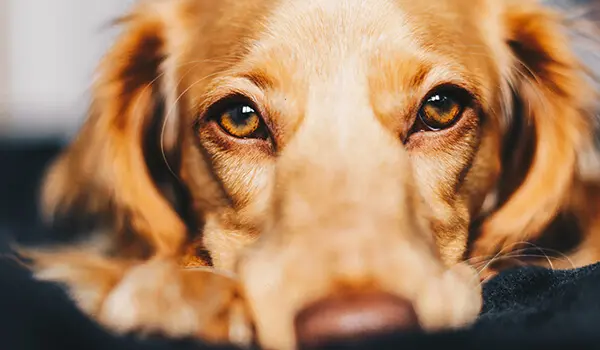We love our pets. They are sweet, funny, cute, beautiful, and snuggly. They are proven to be both physically and emotionally therapeutic. They are even good for our social lives. And perhaps it’s selfish, but humans do love to be loved in return—who else is so happy to see you every time you walk through the door? Pets are furry family.
 What’s more, it appears that as we domesticated dogs, they might have developed this to adapt to their new relationships with humans. How do we know this? Because their wild, wolfy relatives don’t rely on eye-to-eye gazing for bonding. If we take this a step further, modern dogs have even developed the specific muscles that allow them to be so expressive with their eyebrows. Wolves don’t appear to have those muscles at all!
What’s more, it appears that as we domesticated dogs, they might have developed this to adapt to their new relationships with humans. How do we know this? Because their wild, wolfy relatives don’t rely on eye-to-eye gazing for bonding. If we take this a step further, modern dogs have even developed the specific muscles that allow them to be so expressive with their eyebrows. Wolves don’t appear to have those muscles at all!
While that unconditional love from your dog or cat is part of their charming nature, there is science that proves that the most simple of actions between pet and owner is deepening our mutual love every time we do it. Those “puppy dog eyes” are tugging our heart strings by causing an increase in the love hormone, oxytocin.
Humans, as a species, use our eyes for communicating and bonding. Oxytocin, produced by the hypothalamus, is secreted for various reasons, but the emotional, bond-forming payoff is clear. When we gaze into each other’s eyes, there is a boost in our oxytocin levels which deepens emotional connection. This helps us to form bonds, fall in love, and even strengthen some memories.
A 2015 study of dogs determined that the same thing happens with our canine friends. When we gaze into their eyes, we produce oxytocin that makes us love them more. When they gaze in ours, the same thing happens to them. They can even produce oxytocin as a result of smelling ours! Biology is wonderful and weird!
Why Is Your Pooch Giving You Puppy Dog Eyes?
Russell Hartstein, certified dog/cat behaviorist, trainer and CEO (Canine Executive Officer) of Fun Paw Care in Los Angeles explains that “Dogs are highly attuned animals that share our emotional states. Many times, dogs are simply reflecting back our mood, emotion and state of being, which are oftentimes undetected by people.”
Pet parents often mistake their dog’s expressions to be a reaction to the food or treats in their hand, but scientific findings have shown that dogs are more sensitive to a human’s attention than to the object in their hands. Although puppy dog eyes might seem cute to us, sometimes they’re actually a sign that your dog is stressed.
Cute vs. Sad Puppy Eyes—How to Spot the Difference
No pet parent wants their furry friend to feel sad, which is why it’s important to know the difference between when your pooch gives you cute puppy eyes versus sad puppy eyes. Hartstein explains that pet parents “can detect subtle and overt emotional conditions in their pet’s face, such as a tense vs. relaxed mouth, eye openings, eye positioning and dilation, tongue position, and brow and ear positioning.”
Paying attention to all of these factors will reveal a great deal of information about your pooch’s emotional state. You can also determine if your pup has “soft” or “hard” eyes.
Hartstein points out that if your pooch’s eyes are soft, this is the sign of a social dog, with a friendly demeanor, who is affable and confident. A pooch with soft eyes will typically have relaxed eyes and might blink often. This is what most pet parents refer to as the puppy dog eyes that are so easy to get lost in!
“This type of eye contact is not healthy or positive,” warns Hartstein.
It signifies stress, aggression, fear and unfriendly behavior. If your pooch exhibits this facial expression, it does not always mean he is a bad pooch—more than likely, there are outside factors that are causing him stress and putting him on the defensive. If your pup could use some extra comforting, try the Adaptil Electric Dog Diffuser that naturally bathes your home in the canine-appeasing pheromone to calm both puppies and adult dogs.
Avoiding eye contact is completely normal in well-socialized dogs, notes Hartstein.
“While many pet parents will condition and reward their pooch to lock eyes in a loving way with them, your pooch is likely to avoid direct eye contact with strangers or any unfamiliar being, as this can be perceived as confrontational, a threat, instigation and unfriendly,” he says.
Don’t be surprised if your fur baby shies away from unfamiliar contact! If your pup has a tendency to get stressed in social situations, try the ThunderShirt Anxiety & Calming Solution for Dogs to keep him relaxed in unfamiliar situations.
Why Are Puppy Eyes So Irresistible?
We’ve all seen those adorable puppy dog eyes that our pooches give us—they’re so easy to get lost in. But have you ever wondered why dogs give us those cute puppy eyes? If you want to learn more about the science behind dog expressions and how to interpret them, read on to find out what’s behind those puppy eyes and how dog body language really works.